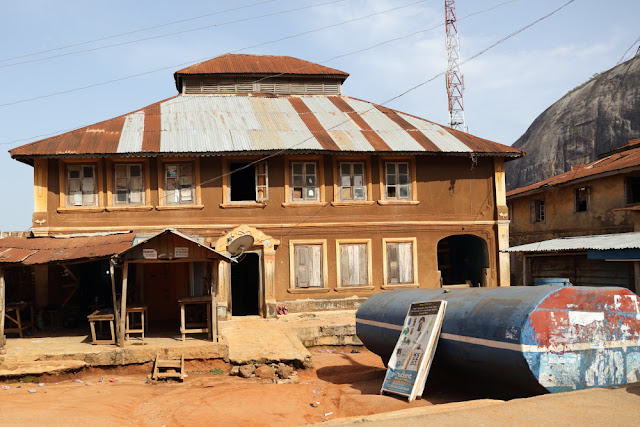 |
| main street of Idanre |
I
danre is famous for its rocky hills popping out of the surrounding plain. The first inhabitants came there from Ile Ife and settled on the hills' plateau. Then in 1928, Christians left under pressure from the Traditionalists to settle outside of the hills in Alade. Later in 1933, some Traditionalists followed the Christians and built their houses at the foothill, which is now known as Idanre city. There are a few recent buildings and a lot of brazilian style houses that have weathered through the years without much maintenance. Like everywhere in Nigeria, roofs of corrugated iron are the norm, recognisable at the rusty colour they soon develop after a few rainy seasons. Red soil and rusty red roofs give the city its colour tones.
The hills, visible from any corner of the recently created city, are like an intermediary between the earth and the sky.
 |
| old brazilian-style house with modern extensions |
The city is stretching, between the hills, like a long ribbon that starts at the north-eastern entrance where the road from Alade passes narrowly between two boulders. One of them wears an advertising for Dark Sailor's rum "Just Dare".
 |
| Dark Sailor's "Just Dare" |
Nowadays the Christians and Muslims have colonised the city and live among the Traditionalists whose number is difficult to assess. We met some at the bottom of a close, at the foot of a rock. There was a burial ceremony which had something joyful about it. Tents were set-up under which people were gathered, seating on plastic chairs, to drink. One of the marquees had been arranged as a dancefloor. A little bit further down the road, Elders were equally sitting on plastic chairs, but this time along a house whose ground was elevated compared to the level of the street. It was like a narrow stage on which they would be lined-up, but also provided them with a very good vantage point on what was going on in the street. I was introduced to the most senior Baba and made to understand that a small donation would be appreciated. Some of the men were very enthusiastic at the prospect of all the things we could do together (money, money). I politely assured them that I would gladly come to see them again and would be delighted to come for the festival in May.
 |
| a wife in the waiting |
Women begged me to photograph them, one of them with a baby wrapped in a bed cover around her hips. She asked for my number which I gave. Since then, many flash-calls have followed but time is the greatest eroder of determination, so she probably gave up the idea that I should marry her, that is, until we meet again!
 |
| Elders sitting at the burial ceremony |
I noticed that the old houses had very often small wooden shacks built in front of them along their facade, probably not for aesthetic reasons but rather as a convenient way to lean against existing structures and also to optimise the use of space. Those constructions were usually for workshops, shops or beer parlours (very popular from the morning onwards).
 |
| rocky landscape for moto-taxis |






Comments
Post a Comment